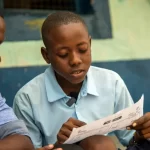The current widespread decline in educational levels in Mali is an alarming reality, with all relevant actors lamenting the worrying trend that has been jeopardising the future of schools and the country for years. A concise field investigation allowed us to understand that an exhaustive list of various factors is at the root of the general decline across school levels. Ineffective school curricula, early enrolment (4-6 years), unending reforms, poor teacher training, parental disengagement, teacher strikes, learner absenteeism and the end of corporal punishment are cited as part of the problem. The 15 people interviewed, including teachers, school officials, trade unionists, parents, observers and students, essentially shared these grievances.
Globally, there has been a sharp drop in education levels, although it is more pronounced in Africa, a region beset by weak production systems, general instability and failing economies.
In Mali, we conducted concise investigations to understand the extent of the problem. We interviewed people without making it apparent that we were carrying out a study and managed to get a clearer idea of the situation.
We contacted a national director and director of CAP, who agreed to speak to us anonymously. They told us the general decline of education is primarily due to the multiple, perpetual reforms, whose pedagogical system teachers and students have struggled to adapt to over the years. The pair also pointed the finger at the inadequate initiatives, highlighting that the official programme is ultimately not applied universally. In addition, they cited a fragile and often uncertain system riddled with corruption and straight passes at all levels, which compromises the integrity of the few officials who try to resist greed. The officials maintained early enrolment at the ages of 4-6 seriously affects the levels of children as they struggle to settle into the school system. Another weighty issue is poor teacher training, resulting in unskilled teachers. Some teachers continue to teach, yet they have not received any training. Worse still, ongoing training is never a priority due to budgetary constraints. The school administration does not cover any of these aspects.
The eight teachers from the Kalanbancoro, Djikoroni, Badialan 2 and Kabala schools we interviewed insist parents should bear the responsibility for their children’s education. However, they say nowadays, parents shirk their responsibilities and do not participate in their children’s education. The learning process is limited to what the children do in class, and parents do not complement what the children do in school by supporting them at home. They also question the prohibition of corporal punishment, which most believe previously kept children on the straight and narrow. Finally, they bemoan their poor living and working conditions; precious few teachers live well, explaining the alarming rate at which the school system is deteriorating.
For the few parents who agreed to share their views, the main bone of contention is the government’s abandonment of its mandate vis-à-vis the school. The rampant privatisation of schools and exorbitant private school fees have led to the collapse of public schools, and the parents feel private schools charge steep fees and are free to do so because the Government does not regulate them. Some of them, especially those whose children are in public schools, feel there is no hope of finding solutions to the insurmountable challenges the schools face. Two of the parents interviewed also raised concerns about sexual abuse, explaining that some girls contract sexually transmitted diseases, with others falling pregnant, often leading to school dropouts or students falling behind.
Some observers assert that the 20% admission rate to the Baccalaureate in the 2021-22 academic year demonstrates the threat to almost all school levels.
Now more than ever, most respondents are convinced that the Government, which does not appear to take its responsibility as a regulatory authority seriously, should play a pivotal role in education. Consequently, most actors follow their own rules, exacerbating the mammoth problems that persistently gnaw at the entire learning process.









